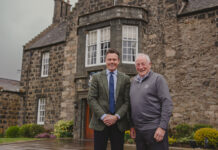Industry must continue to pull together to raise standards, writes Scottish Business Resilience Centre boss Mandy Haeburn Little
AUGUST heralds the start of one of the world’s most significant cultural events – the Edinburgh International Festival.
Four million tickets are sold annually and hundreds of thousands more people descend on the capital to enjoy the diverse range of performances and warm hospitality. That’s why the industry must continue to capitalise on this opportunity and raise standards to create a vibrant leisure economy.
There are nearly 20,000 people employed in Edinburgh’s food and beverage sector (according to latest figures from the City of Edinburgh Council).
In the city’s Grassmarket area alone there are 36 bars, pubs and hotels, making it one of the busiest night time economies in Scotland. Already 19 of the area’s licensed premises have signed up to the Best Bar None Scheme, which awards venues Bronze, Silver or Gold accreditation depending on their commitment to safety, responsible drinking and customer care. The owners and managers of these outlets recognise the importance of creating the highest possible standards and a safe and enjoyable environment.
At a time when the city is flooded with visitors, it’s crucial for the city’s reputation that bar and pub staff offer the best possible experience.
But it’s essential there is a collaborative approach to establishing good practice. The Best Bar None scheme works in partnership with the Scottish Government, Police Scotland, Scottish Fire & Rescue, Licensing Standards/Trading Standards, the Scottish Licensed Trade Association and a variety of other stakeholders, to help reduce alcohol-related harm, crime and disorder. It’s funded by major Scottish drinks producers and distributors, showing their commitment to supporting customers.
Above all the onus is on premise owners to improve their offering through schemes like Best Bar None and, in turn, boost their business and create a booming industry.
If we continue to work collaboratively we can make Scotland’s towns and city centres safer, more attractive places for people to live in and visit.
• Mandy Haeburn Little is director of the Scottish Business Resilience Centre.
























